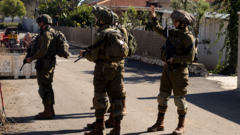Escalating Tensions: Israel and Hezbollah Exchange Strikes Amid Fragile Ceasefire
Tensions have reignited between Israel and Hezbollah after a series of retaliatory strikes that threaten to undermine the recently negotiated ceasefire agreement. On Monday evening, both sides accused each other of violating the truce that was intended to end 13 months of conflict along the Israel-Lebanon border.
The Lebanese public health ministry reported that Israeli strikes on two southern Lebanese villages resulted in at least nine fatalities. The Israel Defense Forces (IDF) claimed to have targeted Hezbollah infrastructure throughout Lebanon, while simultaneously asserting their commitment to the ceasefire agreement.
Hezbollah characterized its actions as a “defensive warning,” launching mortar attacks on an Israeli military position in the disputed Mount Dov area, internationally known as Shebaa Farms. Israel reported no injuries from these strikes in the contested border region.
Israeli Prime Minister Benjamin Netanyahu condemned the Hezbollah attack as a “severe violation of the ceasefire” and vowed a forceful response. This stance is consistent with his earlier statements when the ceasefire was initially announced, warning that Israel would not hesitate to strike if Hezbollah breached the agreement’s terms.
The recent exchange of hostilities highlights the fragility of the negotiated truce. The agreement, brokered with support from the United States and France, aimed to cease fighting in Lebanon and secure Israel from threats posed by Hezbollah and other organizations operating from Lebanese territory.
Key provisions of the agreement include:
– Hezbollah has 60 days to end its armed presence in southern Lebanon
– Israeli forces must withdraw from the area during the same period
– The goal is to establish a more stable and peaceful border region
The US and France had previously emphasized that the agreement would help secure the region and reduce tensions between the two sides. However, Monday’s incidents demonstrate the significant challenges in maintaining such a delicate diplomatic arrangement.
This latest escalation raises concerns about the long-term sustainability of the ceasefire and the potential for further conflict. Both Israel and Hezbollah remain positioned to respond to what they perceive as provocations, creating a volatile situation that could quickly deteriorate.
International observers and diplomatic channels will likely be closely monitoring the situation, hoping to prevent further escalation and preserve the fragile peace agreement. The coming weeks will be crucial in determining whether the ceasefire can hold or if the region will return to a state of sustained conflict.
The incident underscores the complex geopolitical dynamics of the Israel-Lebanon border region and the ongoing challenges in achieving lasting peace and stability in this historically contentious area.




